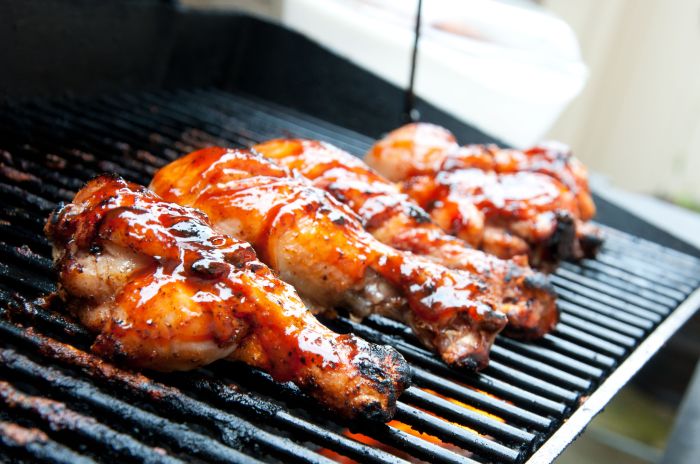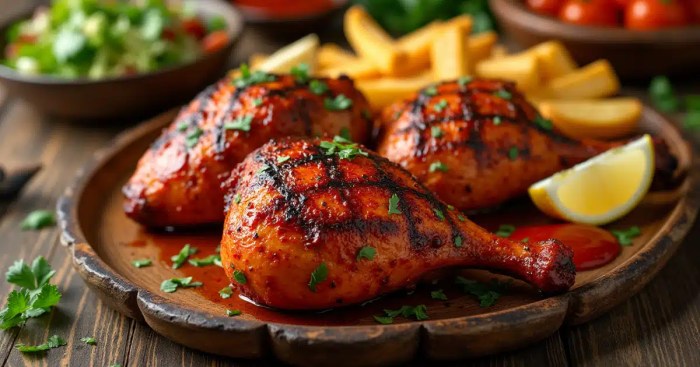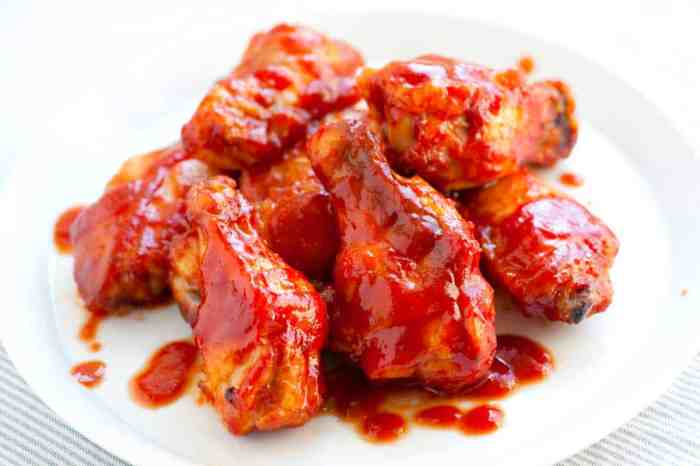BBQ Sauce for Chicken Recipe A Flavorful Guide
BBQ Sauce for Chicken: A Flavorful Exploration: Bbq Sauce For Chicken Recipe
Bbq sauce for chicken recipe – Barbecue sauce, a culinary cornerstone of American cuisine, boasts a rich history evolving from simple vinegar-based concoctions to the diverse array of sweet, smoky, and spicy variations we know today. Its versatility extends seamlessly to chicken, transforming ordinary poultry into a flavorful masterpiece. This exploration delves into the world of BBQ sauce, focusing on crafting delectable chicken dishes.
Introduction to BBQ Sauce for Chicken
The origins of BBQ sauce are deeply rooted in the Southern United States, where early settlers adapted indigenous cooking techniques. Initially, sauces were primarily vinegar-based, relying on readily available ingredients like vinegar, spices, and sometimes molasses. Over time, regional variations emerged, incorporating ingredients like tomatoes, peppers, and sweeteners, resulting in the diverse range of flavors we enjoy today. From the tangy Carolina vinegar sauces to the thick, sweet Kansas City styles, the possibilities are endless.
BBQ sauce’s versatility shines when applied to chicken; it can be used as a marinade, a basting glaze during cooking, or a finishing sauce to enhance flavor and texture.
Common BBQ sauce flavor profiles often fall into categories: sweet (featuring brown sugar, molasses, or honey), savory (emphasizing Worcestershire sauce, soy sauce, or savory spices), smoky (achieved through liquid smoke or smoked paprika), and spicy (incorporating chili powder, cayenne pepper, or hot sauce). The balance of these profiles creates the unique character of each sauce.
Recipe Variations: Sweet & Savory BBQ Chicken
Three distinct BBQ sauce recipes are presented below, showcasing sweet, savory, and smoky profiles. Each recipe provides a unique flavor experience, suitable for various palates and culinary preferences. The visual descriptions below help paint a picture of the finished product.
| Ingredient | Quantity | Step | Notes |
|---|---|---|---|
| Sweet BBQ Sauce: | |||
| Ketchup | 1 cup | 1 | Use high-quality ketchup for best results. |
| Brown Sugar | 1/2 cup | 1 | Packed brown sugar is recommended. |
| Apple Cider Vinegar | 1/4 cup | 1 | Adds a nice tang. |
| Worcestershire Sauce | 2 tablespoons | 1 | Enhances the savory notes. |
| Garlic Powder | 1 teaspoon | 1 | Adjust to taste. |
| Onion Powder | 1 teaspoon | 1 | Adds depth of flavor. |
| Paprika | 1 teaspoon | 1 | Smoked paprika adds a smoky note. |
| Combine all ingredients in a saucepan. | 2 | ||
| Simmer over low heat for 15-20 minutes, stirring occasionally. | 3 | Until thickened to desired consistency. | |
| Savory BBQ Sauce: | |||
| Soy Sauce | 1/2 cup | 1 | Adds umami and saltiness. |
| Honey | 1/4 cup | 1 | Balances the saltiness of soy sauce. |
| Rice Vinegar | 2 tablespoons | 1 | Provides a subtle acidity. |
| Ginger | 1 tablespoon (minced) | 1 | Adds a spicy kick. |
| Garlic | 2 cloves (minced) | 1 | Fresh garlic is preferred. |
| Sesame Oil | 1 teaspoon | 1 | Adds a nutty aroma. |
| Combine all ingredients in a saucepan. | 2 | ||
| Simmer over low heat for 10-15 minutes, stirring occasionally. | 3 | Until slightly thickened. | |
| Smoky BBQ Sauce: | |||
| Tomato Paste | 1/2 cup | 1 | Provides a rich base. |
| Molasses | 1/4 cup | 1 | Adds sweetness and depth. |
| Apple Cider Vinegar | 2 tablespoons | 1 | Balances the sweetness. |
| Liquid Smoke | 1 tablespoon | 1 | Adds a smoky flavor. |
| Chipotle Powder | 1 teaspoon | 1 | Adds a smoky heat. |
| Garlic Powder | 1 teaspoon | 1 | Enhances the savory notes. |
| Combine all ingredients in a saucepan. | 2 | ||
| Simmer over low heat for 15-20 minutes, stirring occasionally. | 3 | Until thickened. |
Sweet BBQ Sauce: This sauce is a deep reddish-brown, with a smooth, slightly thick consistency. The aroma is rich with the sweet scent of brown sugar and a hint of vinegar.
Savory BBQ Sauce: This sauce is a darker brown, almost bordering on black, with a thinner consistency than the sweet sauce. The aroma is distinctly savory, with hints of ginger and sesame oil.
Smoky BBQ Sauce: This sauce is a deep, dark brown, with a slightly thicker consistency due to the tomato paste. The aroma is strongly smoky, with hints of chipotle pepper adding a subtle warmth.
The three sauces offer contrasting flavor profiles. The sweet sauce provides a balance of sweetness and tang, while the savory sauce delivers a complex umami flavor. The smoky sauce delivers a bold, smoky flavor with a hint of heat.
Many find a great BBQ sauce for chicken recipe hinges on achieving the perfect balance of sweet and smoky flavors. If you’re looking to experiment with unique flavor profiles, consider incorporating elements from other sauces; for instance, the tangy depth of a amogio sauce recipe could add an unexpected twist. Ultimately, the best BBQ sauce for chicken is the one that satisfies your palate, so feel free to adapt and innovate!
Cooking Methods: Grilling, Baking, and Smoking

Source: thespruceeats.com
Three popular methods for cooking BBQ chicken are grilling, baking, and smoking. Each method offers unique advantages and disadvantages, impacting the final texture and flavor of the chicken.
- Grilling: Grilling imparts a beautiful char and smoky flavor, but requires careful attention to prevent burning.
- Baking: Baking provides a more even cooking process, ideal for larger batches, but may result in less pronounced smoky flavor.
- Smoking: Smoking yields the most intense smoky flavor, but requires specialized equipment and a longer cooking time.
- Grilling:
- Advantages: Charred exterior, smoky flavor, relatively quick cooking time.
- Disadvantages: Requires attention to prevent burning, uneven cooking if not managed properly.
- Tips: Marinate chicken beforehand, use medium-high heat, and baste frequently.
- Baking:
- Advantages: Even cooking, less chance of burning, easy to manage.
- Disadvantages: Less smoky flavor compared to grilling or smoking.
- Tips: Use a baking dish, baste halfway through, and check for doneness with a meat thermometer.
- Smoking:
- Advantages: Intense smoky flavor, tender and juicy chicken.
- Disadvantages: Requires specialized equipment, longer cooking time.
- Tips: Use quality wood chips, maintain consistent temperature, and monitor the internal temperature of the chicken.
BBQ Sauce Ingredients and Substitutions
Understanding the role of each ingredient in BBQ sauce allows for creative substitutions. Common ingredients include ketchup, vinegar, sweeteners (brown sugar, honey, molasses), spices (paprika, garlic powder, onion powder), and liquid smoke. These ingredients contribute to the overall flavor profile, and substituting one can significantly alter the final taste.
| Ingredient | Substitute | Flavor Impact | Considerations |
|---|---|---|---|
| Ketchup | Tomato paste + vinegar | Slightly less sweet, more tangy | Adjust sweetness with added sugar |
| Brown Sugar | Honey or Molasses | Honey adds a floral note, molasses adds a deeper, richer flavor | Adjust quantity based on desired sweetness |
| Apple Cider Vinegar | White wine vinegar or Rice Vinegar | White wine vinegar adds a sharper tang, rice vinegar adds a milder acidity | Adjust quantity based on desired acidity |
| Liquid Smoke | Smoked Paprika | Less intense smoky flavor | Use a generous amount of smoked paprika |
Serving Suggestions and Side Dishes, Bbq sauce for chicken recipe

Source: chickenrecipe.net
BBQ chicken is incredibly versatile and pairs well with a variety of side dishes. Creative serving suggestions include using it in salads, tacos, or sandwiches. The smoky sweetness of the chicken complements many flavors.
- Serving Suggestions: BBQ chicken salad, BBQ chicken tacos, BBQ chicken sandwiches, BBQ chicken pizza.
- Side Dish Suggestions: Coleslaw, potato salad, corn on the cob, baked beans, mac and cheese.
Sample Menu:
- Main Course: Sweet & Savory BBQ Chicken
- Side Dishes: Creamy Coleslaw, Corn on the Cob, and Baked Beans
- Dessert: Peach Cobbler
Advanced Techniques and Flavor Enhancements
Elevating BBQ chicken to the next level involves techniques like marinating, basting, and glazing. Marinating tenderizes the chicken and infuses it with flavor. Basting keeps the chicken moist and adds flavor throughout the cooking process. Glazing adds a final layer of flavor and shine.
Different woods used in smoking impart unique smoky flavors. Hickory provides a strong, bacon-like flavor; mesquite offers a bold, slightly bitter taste; and applewood adds a milder, sweeter note. Combining different flavor profiles in your BBQ sauce, such as sweet and spicy, or smoky and savory, creates unique and complex flavor combinations.
Storage and Leftovers

Source: inspiredtaste.net
Proper storage is crucial for maintaining the quality and safety of leftover BBQ chicken and sauce. Leftover chicken should be refrigerated within two hours of cooking and consumed within 3-4 days. Homemade BBQ sauce should be stored in an airtight container in the refrigerator for up to a week. Store-bought BBQ sauce typically has a longer shelf life, as indicated on the label.
Leftover BBQ chicken can be repurposed in various dishes, such as chicken salad sandwiches, quesadillas, or added to soups and stews.
FAQ Summary
Can I use store-bought BBQ sauce instead of making my own?
Absolutely! Store-bought sauces offer convenience. Choose a sauce that complements your preferred flavor profile (sweet, smoky, etc.).
How long can I store leftover BBQ chicken?
Store leftover BBQ chicken in an airtight container in the refrigerator for up to 3-4 days.
What are some good side dishes for BBQ chicken?
Coleslaw, corn on the cob, potato salad, baked beans, and mac and cheese are all excellent choices.
Can I freeze leftover BBQ chicken?
Yes, you can freeze leftover BBQ chicken for up to 2-3 months. Wrap it tightly in freezer-safe wrap or place it in a freezer bag to prevent freezer burn.




















